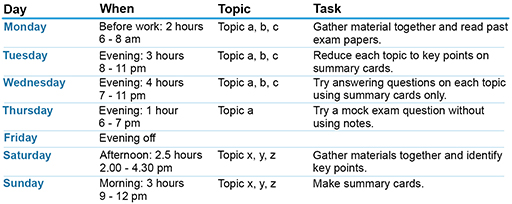3.4 Stage 4: Making a revision timetable
There are no hard and fast rules about when you should start to revise. Some people say you should have a revision strategy set up from the start of a course, typically involving careful and systematic highlighting of study texts and the making of condensed notes on key course elements. Others would say that it is only in the later stages of a course that material comes together in a sufficiently meaningful way to make a revision strategy possible. The time you have available, and your own study style, will probably shape your revision timing and approach. You may even find that your approach to revision changes from year to year, depending on your personal circumstances and the format and demands of your course. Don’t consider this a sign of disorganisation. On the contrary. You should congratulate yourself that you have a flexible repertoire of study skills on which you can draw when circumstances dictate.
If you are a perfectionist, then be realistic. Sometimes you may have to compromise and accept that, in better times, you could have revised longer and more effectively, and probably got better results - that’s life! The chances are that you have learned from the experience and things will be better next time.
Having suggested that every year may be different, we would like to also suggest that it is a good idea to make a revision plan, even if this needs to be modified as time and life go on. As you move into the last third of your course, it would be a good idea to look ahead to the various demands, course-related and otherwise, which are likely to be made on you as your exam date draws near. You are likely to have final assignments or projects to submit, together with the usual expected and unexpected demands that work, family, and social life place on you. You can usually successfully work around busy periods, as long as you plan them into your revision schedule.
Activity 6
Figure 3 shows an example week of a study calendar. Using the headings in bold, make out your own study calendar to begin planning the lead up to your exam. You will need your calendar to cover more than one week. Start by putting in the exam date itself, or a provisional date, if the actual date has not yet been set. Now put in other important work, social, and family commitments. Put in today’s date, if that is possible within the time frame of the calendar.
How do things look? Do you feel reassured that you have plenty of time to revise? Have you allowed time for unexpected events? Doing this activity will have enabled you to plan your revision time realistically. If you are likely to be under pressure at particular points up to and around the exam time, you will be able to anticipate this, rather than be taken by surprise. This will allow you to make best use of the spaces in your revision calendar. This calendar won’t remain static. You will probably have to cross out, insert and shift events and activities throughout your revision period, but at least you are keeping yourself in the picture and, arguably, you stay in control of your time as much as any of us can
It is generally the case that we have good times to work, and times when we work less well. These periods tend to be very individual, and sometimes we have to pause to reflect on our own most productive time. When you are filling out your revision timetable, be realistic about the times you work best. Put your most important active work into those slots, and allot more routine tasks to less productive times.
You have now identified your main revision sessions on your calendar. Early in the revision period you should identify slots in which you will actively revise the topic areas you have decided to revise. It is likely that you will have to review and reschedule your revision plans on a fairly regular basis. However, if you find that you are constantly reorganising your plans, ask yourself if you are setting yourself over-demanding targets.

